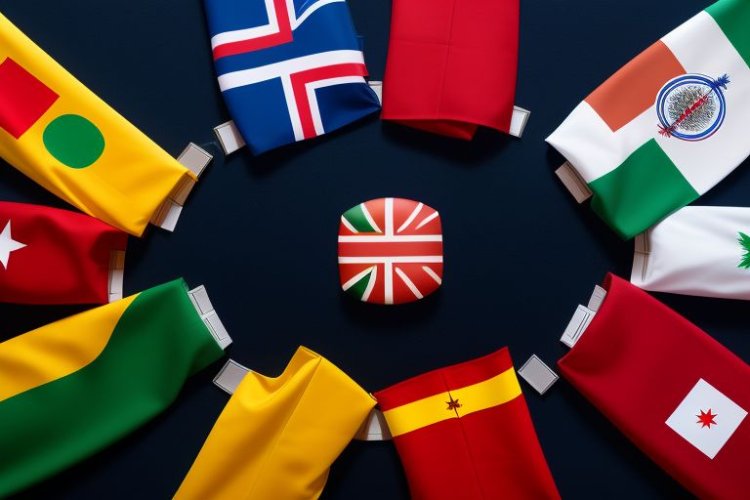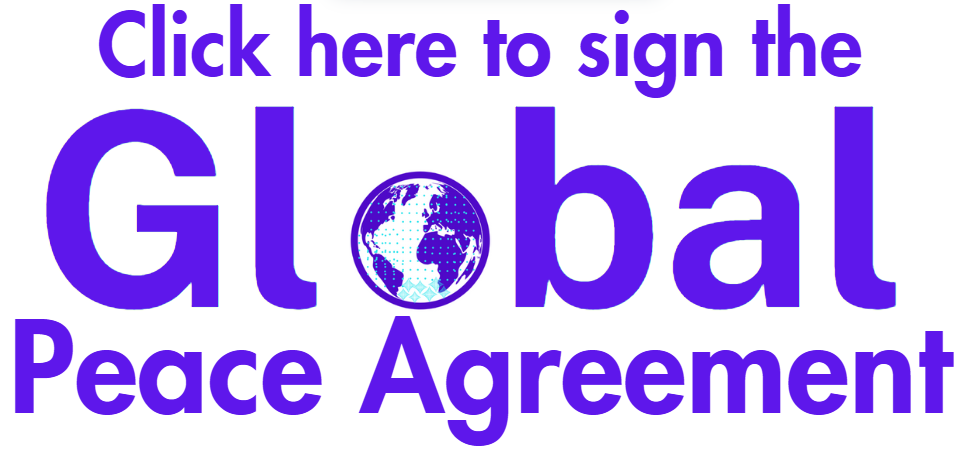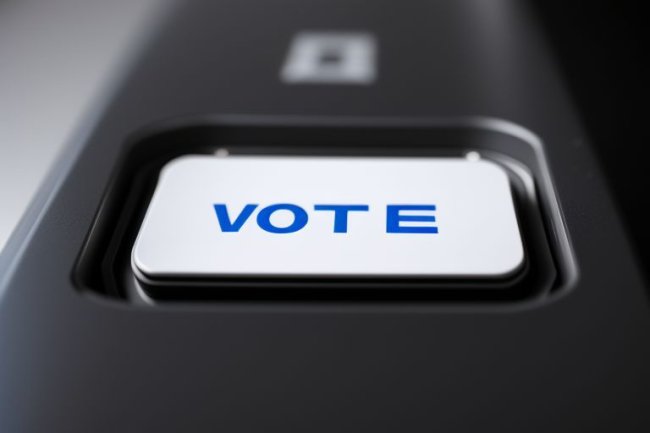EQUAL RIGHTS OF NATIONS
The principle of Equal Rights of Nations conveys the core notion that every country, irrespective of its size, influence, or geopolitical status, merits equivalent respect and entitlements within the global community.

It recognizes each nation's inherent dignity and sovereignty, emphasizing that no nation should be subjugated or marginalized due to economic, political, or social disparities. This concept affirms that each nation is entitled to engage in global matters with parity. These shape determinations impact its future and receive just and equitable treatment from other nations.
At its core, the equal rights of nations underscore the need for a balanced and just world order where power imbalances are eradicated and cooperation prevails over exploitation. This principle extends beyond diplomacy and politics; it permeates economic interactions, trade agreements, environmental protection, and the pursuit of global peace. It is a call to dismantle systemic inequalities that have historically favored certain nations while disadvantaging others. The equal rights of nations serve as a cornerstone for building a world where unity, diversity, and shared prosperity prevail.
In international relations, each nation contributes a unique note, a distinct melody that shapes the grand composition of global harmony. Yet, not all voices have been granted equal resonance. For too long, the world stage has been dominated by the powerful, their voices amplified while the whispers of the marginalized remain unheard. Amidst this discord, the concept of "Equal Rights of Nations" emerges, seeking to restore equilibrium to the symphony of sovereignty.
Imagine a world where the size of a nation's landmass holds no sway over the magnitude of its influence. Imagine a community where economic prowess is balanced with the intrinsic value of cultural heritage and human dignity. This is the world envisioned by the equal rights of nations – a world where the chorus of voices, whether from sprawling continents or tiny archipelagos, resounds with the same weight and importance.
This chapter delves into the tapestry of equal rights that weaves nations together, transcending boundaries and ideologies. We explore how the principle of equal rights challenges the status quo, disrupting the patterns of dominance that have shaped history. Through the lens of diplomacy, trade, resource management, and sustainable development, we uncover the profound impact that recognizing and upholding the equal rights of nations can have on the global stage.
The Fundamental Principle of Equal Rights Among Nations
In the global landscape, where diverse cultures interlace, economies merge, and common aspirations give birth to a symphony of unity, a fundamental principle emerges, much like the North Star guiding nations towards a harmonious coexistence. This principle, akin to an eternal melody echoing beyond borders, unveils the anthem of equal rights among nations. It's a pledge that each nation, irrespective of its stature, possesses an unassailable right to waltz to the tune of self-determination, to compose its narrative on the canvas of sovereignty, and to stand united on the worldwide stage of collective aspirations.
At its core, this principle recognizes that the sovereignty of nations is an intrinsic facet entwined with the threads of self-governance and cultural identity. It is the bedrock on which international relationships are forged, underpinning diplomacy, trade, and shared endeavors. The principle's essence resonates in the halls of the United Nations, where diverse voices converge to discuss, negotiate, and aspire to create a world where the sanctity of equality overshadows the concept of might. Through the lens of history and jurisprudence, it is evident that equal rights among nations are not merely a concept but a palpable reality. This framework shapes the destiny of humanity.
Historical and Legal Foundations
The principle of equal rights among nations is a testament to the progressing story of human civilization, interwoven across historical epochs and united by the intricate fabric of legality. Its roots can be retraced to pivotal junctures that have molded the contemporary world.
The emergence of the Westphalian Treaty in 1648 marked a turning point in the evolution of nation-states. This landmark agreement, which concluded the Thirty Years' War, introduced the concept of state sovereignty and territorial integrity. The Treaty of Westphalia forged the notion that nations had the right to chart their destinies, free from external interference. This embryonic seedling of equal rights laid the foundation for the principle that would later blossom into a vital doctrine in international relations.
Fast forward to 1945, the aftermath of a world ravaged by two devastating World Wars and on the cusp of a new era witnessed the establishment of the United Nations (UN). A unified reaction to the atrocities of conflict, the UN Charter infused vitality into the principle of equal rights among nations. At its essence, the Charter entrenched the principles of sovereign equality and the prohibition of meddling in the internal affairs of states. This pivotal moment of global solidarity marked a conscious step towards acknowledging the inherent rights of all nations, irrespective of their size, economic prowess, or political influence.
As the convocation of diverse nations, the United Nations was envisioned as a beacon of hope, a platform for dialogue, cooperation, and shared aspirations. The Charter's fundamental commitment to equal rights among nations was a clarion call to transcend the old paradigms of power politics and forge a new trajectory that honored the sanctity of sovereignty.
The journey of equal rights found expression in grand charters and the multitude of international treaties and customary laws that evolved over time. These documents, signed and ratified by nations, underscored the enduring commitment to equal rights, ensuring that this principle became an inseparable part of the global legal fabric. From the Geneva Conventions to the Universal Declaration of Human Rights, from the Vienna Convention on Diplomatic Relations to the Rome Statute of the Within the framework of the International Criminal Court, the principle of equal rights among nations resounds as a fundamental pillar that sustains the very core of these agreements.
The historical and legal foundations of equal rights among nations are deeply intertwined, spanning centuries and continents. From the seeds sown in the Westphalian Treaty to the blossoming of the United Nations and from crafting international treaties to establishing customary laws, the principle is firmly entrenched. It serves as a testament to humanity's collective endeavor to foster a world where nations, regardless of their disparities, are united by mutual respect, cooperation, and shared progress.
Sovereignty and Self-Determination
Sovereignty and self-determination are the bedrock principles of equal rights among nations. These principles, deeply interwoven into the fabric of global discourse, encapsulate the essence of a world where nations govern their destinies and aspirations flourish unencumbered.
Sovereignty, a concept rooted in the Westphalian Treaty and crystallized over centuries, is the guardian of a nation's autonomy. It signifies an unassailable right that every nation possesses the exclusive prerogative to shape its internal affairs without external intrusion. Within the realm of sovereignty lies the power to preserve cultural heritage, protect the rights of citizens, and exercise governance as a manifestation of national identity. In a world of diverse cultures and traditions, the principle of sovereignty provides the canvas on which nations can paint their distinctive narratives.
Conversely, self-determination amplifies the symphony of sovereignty by affording nations the liberty to forge their destinies. It is the right of nations to determine their political, economic, and cultural trajectories freely. Self-determination honors the authenticity of each nation's journey, recognizing that their progress need not mimic a predetermined model but should resonate with their unique context. This principle is vital for nurturing sustainable development, empowering marginalized communities, and forging pathways toward equitable prosperity.
Moreover, the harmonious interplay of sovereignty and self-determination contributes immeasurably to global stability. When nations are assured of their sovereignty, they become active participants in a collective narrative, fostering a sense of trust and collaboration. By allowing nations to sculpt their own futures, self-determination minimizes the potential for resentment and alienation that can fuel conflicts.
By placing the reins of governance in the hands of nations, these principles cultivate an atmosphere of peaceful coexistence. The foundation for fruitful diplomacy and cooperation is established when each nation's distinct identity is valued and its aspirations respected. The absence of external imposition promotes diplomatic dialogue, fostering understanding and mitigating the risk of misunderstandings that can breed hostility.
In essence, sovereignty and self-determination are not merely theoretical concepts; they are the cornerstones of a world in which nations' external influences do not shackle nations' principles. They are the keys to a harmonious world where diverse voices harmonize and cooperation supersedes conflict. They beckon us towards a future where equal rights flourish, bridging gaps, celebrating diversity, and paving the way for a global tapestry woven with the threads of mutual respect and collective progress.
Non-Discrimination and Non-Intervention
Equal rights among nations entail the prohibition of discrimination and intervention by more powerful nations in the internal affairs of others. These principles stand as firm pillars, staunchly opposing the specter of prejudice and the shadow of undue interference that can disrupt the delicate equilibrium of international relations.
Non-discrimination, a beacon that has illuminated the path towards justice throughout history, extends its brilliance to the realm of nations. It's the solemn affirmation that every nation, regardless of size, wealth, or influence, merits equal treatment. This principle underlines the irrefutable truth that all nations share a common platform of respect and mutual recognition. By rejecting the toxic notion of hierarchy, non-discrimination fosters an environment where decisions are reached collaboratively and the interests of all are validated.
Parallel to non-discrimination, the principle of non-intervention stands as a guardian of national autonomy.
It is a firm declaration that powerful countries must refrain from interfering in other people's internal issues, respecting the sacred space each country deserves to develop its sovereign identity.
A symphony of impartiality resonates by championing non-intervention, silencing the dissonance of manipulation and coercion. This principle doesn't merely shield weaker nations; it empowers them to chart their destinies and foster self-reliance.
Collective decision-making, a cornerstone of these principles, crystallizes the essence of diplomacy. Decisions shaped by the collaborative symphony of diverse nations are inherently more robust and representative in a world where every voice counts. Non-discrimination and non-intervention harmonize within the framework of shared decision-making, forging alliances that transcend the confines of self-interest and ushering in an era where diplomacy is an instrument of understanding rather than dominance.
The significance of non-discrimination and non-intervention cannot be overstated in their contribution to conflict prevention. These principles preclude the ignition of discord by extinguishing the sparks of inequality and repression. When nations are free from the specter of external interference, they're more inclined to focus on growth, development, and international cooperation, contributing to a tapestry woven with threads of mutual respect and shared progress.
Non-discrimination and non-intervention illuminate the path toward a world where nations coexist in an ecosystem of respect and mutual understanding. They carve a space where the symphony of diplomacy flourishes and where the empowerment of nations, irrespective of their might, fosters a fabric of unity. Upholding these principles, we not only safeguard the equal rights of nations but also nurture a legacy of equilibrium, harmony, and a world where the resplendent hues of diversity illuminate the stage of international relations.
International Cooperation and Collective Security
The principle of equal rights among nations resonates as an individualistic affirmation and a collective anthem of international cooperation. This principle envisions a world where nations collaborate harmoniously, pooling their strengths to address shared challenges, navigate complex issues, and champion the common good.
Collaborative initiatives serve as tangible manifestations of this principle. Trade agreements, for instance, weave economic ties that transcend borders, fostering prosperity through mutually beneficial exchanges. Climate accords acknowledge the universal responsibility to safeguard our planet, where nations collectively commit to mitigating environmental degradation. In humanitarian endeavors, nations band together to alleviate suffering in times of crisis, recognizing the interconnectedness of human well-being.
Collective security mechanisms are another profound manifestation of the principle of equal rights. Institutions like the United Nations establish frameworks that emphasize mutual defense and the prevention of conflicts. These mechanisms underscore the pivotal role of unity in safeguarding peace, emphasizing that a threat to one nation's security is a concern for all. The concept of "collective security" encapsulates the shared understanding that the safety of the global community hinges upon the collective resolve to prevent aggression and maintain stability.
However, the practical implementation of these ideals encounters the intricate tapestry of geopolitics, power dynamics, and cultural nuances. The challenge lies in harmonizing national interests with the pursuit of global welfare. Geopolitical ambitions can often eclipse the spirit of cooperation, hindering progress in initiatives like disarmament and environmental protection. The power dynamics inherent in international relations sometimes grant disproportionate influence to certain nations, undermining equal rights.
The United Nations Security Council exemplifies the potential and challenges in implementing equal rights among nations. While constructed with the intent of safeguarding international peace and security, the structure and veto authority of the Security Council has initiated dialogues regarding equity and inclusiveness. The principle of equal rights occasionally clashes with political realities, as influential nations exert their influence over decisions in manners that may not invariably harmonize with the broader global welfare.
The principle of equal rights among nations weaves a complex yet harmonious tapestry of international cooperation and collective security. It is a testament to the power of unity in addressing global challenges and securing peace. While challenges persist due to the intricacies of geopolitics and power dynamics, the ongoing pursuit of equal rights serves as a reminder that the symphony of cooperation and shared responsibility can harmonize the diverse voices of nations on the global stage.
Strategies to Promote Equal Rights Among Nations
Promoting equal rights among nations requires a multifaceted approach that embraces diplomacy, cooperation, and empowerment. Here are key guiding strategies to foster an environment where nations can thrive on the foundation of equality:
1. Promoting Diplomacy: Diplomacy is the linchpin for ensuring equal rights among nations. Nations can peacefully resolve disputes and work towards common goals by engaging in open dialogues and negotiations.
2. Enhancing International Organizations: By bolstering the capabilities and efficacy of international entities, such as the UN, the execution of equal rights principles can be improved through unbiased mediation, conflict settlement, and humanitarian support.
3. Transparency and Accountability: Encouraging transparency and accountability in international relations fosters trust and prevents abuses of power. Nations can uphold these principles by adhering to human rights standards, reporting on their actions, and participating in peer reviews.
4. Empowering Developing Nations: Providing technical assistance, capacity-building, and financial support to developing nations empowers them to fully enjoy their equal rights and contribute to the global community.
5. Promoting Education and Cultural Exchange: Enhancing cultural exchange and educational programs fosters mutual understanding and respect among nations, mitigating misunderstandings and prejudices that hinder applying equal rights.
The principle of equal rights among nations is a vital and timeless concept that transcends political boundaries and national interests. It offers a blueprint for fostering global harmony, cooperation, and sustainable development. By embracing the principles of sovereignty, self-determination, non-discrimination, and international cooperation, nations can collectively create a world where peace, justice, and progress prevail. Through diplomacy, strengthening international organizations, promoting transparency, empowering developing nations, and fostering cultural exchange, the promise of equal rights among nations can be realized, paving the way for a more equitable and interconnected future.
Historical and Current Examples of Inequality Among Nations
In the vast arena of international relations, where the struggle for dominance and influence unfolds, the principle of equal rights among nations stands as a noble ideal, promising a harmonious world of shared progress. Yet, beneath this aspiration lies a stark reality – the enduring inequalities that cast shadows across the global stage. As historical legacies and contemporary events intersect, an undeniable truth emerges: while the vision of equal rights remains unwavering, the path toward its realization is riddled with complex disparities, historical imprints, and the intricate tapestry of power dynamics.
As the annals of time unfold, historical epochs have etched the genesis of inequality onto the international canvas. The colonial era is an undeniable testament to power dynamics that sowed the seeds of inequality. The scramble for Africa in the late 19th century exemplifies the way colonial powers delineated borders without considering indigenous cultures, leading to enduring conflicts and societal divisions.
The Cold War, an epoch of ideological rivalry between superpowers, further propagated inequality on a global scale. Nations ensnared in the ideological tussle, such as Korea and Vietnam, bore the brunt of proxy conflicts, exacerbating the gulf between East and West. Even as the era of colonization waned, the vestiges of inequality persisted through post-colonial power struggles. Former colonial powers maintained economic leverage, perpetuating neo-colonial practices and resource exploitation, often at the expense of marginalized nations striving for self-determination.
In contemporary realities, echoes of historical inequities reverberate through the present circumstances, underscoring the tenacious nature of this global challenge. Paradoxically, economic disparities persist in a world of abundant resources. Developed nations flaunt prosperity, while impoverished nations grapple with the scourge of poverty. The GDP per capita of affluent nations towers astronomically above their low-income counterparts, perpetuating a glaring economic imbalance.
The COVID-19 pandemic, a defining global event, laid bare the gaping fissures in healthcare equity. Wealthy nations secured swift access to life-saving vaccines, while countless developing nations struggled to secure even basic medical supplies, exposing a dire imbalance in global healthcare access. Amid the information age, technological progress deepens the digital divide. Advanced nations harness technology for societal progress, while marginalized nations confront restricted internet access, amplifying educational and economic inequalities.
The global issue of environmental degradation further underscores inequities. Despite being the primary contributors to climate change, developed nations possess greater resources to adapt, leaving vulnerable nations to bear the brunt of environmental consequences. In a paradox of injustice, inequality often fuels conflicts.
The Syrian civil war is a stark example of socio-economic disparities and political oppression converging, culminating in violent upheaval.
Confronted with the historical roots and contemporary manifestations of inequality, a clarion call to action reverberates. The symphony of history serves as a haunting refrain, reminding humanity that progress is not an inevitable tide. The tapestry of nations remains interwoven with disparities that cast a shadow on the promise of equal rights. Diplomacy, cooperation, and a collective commitment to justice are imperative to transcend this darkness.
Addressing economic disparities demands a shift towards fair trade practices and inclusive economic policies. Strengthening healthcare equity requires a global resolve to ensure equal access to medical resources. Bridging the digital divide mandates concerted efforts to provide universal internet access and technological resources.
Environmental sustainability necessitates international cooperation to mitigate climate change and ensure equitable distribution of its impacts. Confronting historical injustices involves acknowledging the lingering effects of colonialism and working toward redress. As these efforts amalgamate, they can pave the path toward equality among nations.
Charting the Path Forward: Uniting for Equal Rights
In this pursuit of a just and equitable tomorrow, the world finds itself at a crossroads. The complexities embedded within historical inequalities and present-day disparities necessitate bold actions, reimagined strategies, and a relentless commitment to reshaping the global narrative.
The legacy of colonization is a stark reminder that inequality can be deeply entrenched, leaving lasting scars on nations and generations. Acknowledging this painful history is a crucial step toward redressing imbalances. Both economic and symbolic reparations can pave the way for healing wounds that still fester.
Collaborative initiatives are vital to bridge the gaps that history has widened. International aid programs, education exchanges, and technology transfer can empower marginalized nations to stand on an equal footing. By sharing knowledge and resources, the global community can dismantle the barriers that perpetuate inequality.
Economic empowerment also hinges on reforming global trade practices. Restructuring trade agreements to be fair and inclusive can uplift nations historically marginalized in the global economic arena. Such efforts can catalyze sustainable growth, diminish poverty, and contribute to the harmonious coexistence of nations.
The pandemic has brought healthcare access into the spotlight, necessitating transformative changes. International collaborations can enhance healthcare infrastructure, guaranteeing that nations in need are prepared to effectively address health emergencies. The pandemic has emphasized that global health functions as an interconnected system; a vulnerability in one place poses a risk to humanity worldwide.
The digital divide, a pressing concern in the digital age, requires innovative solutions. Initiatives to provide affordable internet access, technological training, and digital resources to underserved communities can narrow the gap and democratize opportunities for education, economic participation, and innovation.
Within the framework of addressing climate change, the concept of common but differentiated responsibilities gains significance. Wealthier countries, given their greater involvement in causing environmental degradation, bear an ethical obligation to support vulnerable nations in adjusting to and mitigating the impacts of climate change. Financing sustainable development and sharing technological advancements can foster a more balanced global response to this shared challenge.
As the threads of history are rewoven with contemporary narratives, international institutions play a pivotal role. The United Nations, among others, serves as a platform for dialogue, cooperation, and conflict resolution. Yet, these institutions must be continually reformed to ensure equitable representation and to prevent powerful nations from exerting undue influence.
A world characterized by equal rights among nations demands a shift in mindset and a collective commitment to justice. Education assumes a pivotal role in steering this transformation. Curricula emphasizing global citizenship, cultural comprehension, and empathy can potentially cultivate generations of individuals committed to eradicating inequalities.
In crafting this just tomorrow, the echoes of history act as both a cautionary tale and a guiding light. The struggles of the past caution us against complacency, while the strides toward justice offer a beacon of hope. It is within humanity's power to disrupt the cycle of inequality and shape a world where nations, regardless of their past or present circumstances, stand as equals.
The journey towards equal rights among nations is a continuous, evolving process. Historical imbalances and present-day inequalities are a call to action rather than a roadblock. Humanity can dismantle the structures that perpetuate inequality by redressing historical injustices, fostering collaboration, and reforming global systems. Through collective efforts driven by the belief in justice and the commitment to shared progress, the symphony of nations can harmonize into a chorus of equality on the global stage.
Overcoming Hurdles to Implementing Equal Rights Globally
Pursuing equal rights on a global scale is a noble endeavor that seeks to eradicate the age-old shackles of discrimination, bias, and inequality that have plagued societies for centuries. While the world has made considerable progress in recognizing and advocating for equal rights, numerous hurdles still impede the comprehensive implementation of these rights across all corners of the globe.
Let’s delve into these multifaceted challenges that obstruct the relights worldwide while also off innovative strategies to overcome these hurdles and pave the way for a more equitable future.
1. Cultural Diversity and Norms
One of the most prominent hurdles to implementing equal rights globally is the incredible diversity of cultures, traditions, and norms across different regions and societies. Cultural relativism often poses a challenge, as what may be considered a fundamental right in one culture might be viewed as a breach of norms in another. This divergence can impede the creation of a universally accepted framework for equal rights, as reconciling cultural differences while upholding basic human rights can be complex.
2. Lack of Political Will
Another significant obstacle lies in governments' and leaders' need for more political will to prioritize and champion equal rights. In many instances, governments prioritize their political agendas over the rights of their citizens, leading to policies and practices that perpetuate inequality. For instance, gender-based discrimination, still rampant in many parts of the world, stems from a lack of political commitment to challenging and changing existing power dynamics.
3. Economic Disparities
Economic inequalities continue to be a major hurdle toward global equal rights. Socio-economic status often influences access to education, healthcare, and employment opportunities, further deepening existing disparities. Countries with high poverty levels struggle to allocate resources toward social welfare programs that uplift marginalized communities and promote equal rights.
4. Gender Inequality
Gender discrimination is a persistent barrier to equal rights across the world. Women continue to face unequal pay, limited representation in leadership roles, and systemic violence. Changing deeply ingrained gender norms and biases requires comprehensive strategies that challenge traditional power structures and promote gender equality early on.
5. Lack of Access to Education
Education is a fundamental tool for empowerment and the realization of equal rights. However, millions of children worldwide are denied access to quality education due to poverty, conflict, and gender biases. This lack of education perpetuates cycles of inequality, limiting opportunities for individuals to break free from their circumstances.
6. Legal and Judicial Barriers
While legal frameworks exist to protect equal rights, their implementation and enforcement often fall short. Biased legal systems, corruption, and lack of awareness about rights can hinder progress. Moreover, legal barriers may target specific marginalized groups, including ethnic and religious minorities, refugees, further exacerbating inequality.
Strategies for Overcoming the Hurdles
1. Cultural Sensitivity and Education: Recognizing the diversity of cultures while promoting universal human rights can be achieved through education and awareness campaigns. Governments, NGOs, and international organizations should collaborate to develop culturally sensitive educational materials highlighting the importance of equal rights within various traditions.
2. International Diplomacy and Cooperation: Global issues demand global solutions. International organizations like the United Nations can play a pivotal role in fostering dialogue among nations, encouraging the adoption of universal human rights standards, and promoting cooperation in addressing common challenges.
3. Political Empowerment and Accountability: Citizens must hold their governments responsible for upholding equal rights.
Civil society groups can be crucial in promoting policies that improve equality and monitoring how well governments are doing in upholding their pledges.
4. Economic Reforms and Social Safety Nets: Governments can implement economic reforms prioritizing poverty alleviation and equitable wealth distribution. By providing social safety nets and investing in education and healthcare, countries can create a more level playing field for all citizens.
5. Promoting Gender Mainstreaming: Integrating gender perspectives into all policies, programs, and projects can help break down barriers to gender equality. Efforts to enhance women's economic, political, and social empowerment can result in a more harmonized and just society.
6. Inclusive Education Initiatives: Governments and organizations should invest in initiatives that ensure quality education for all, particularly focusing on marginalized groups. By promoting inclusivity in education, societies can break the cycle of poverty and discrimination.
7. Strengthening Judicial Systems: Efforts to reform legal systems should be pursued vigorously, including measures to eliminate corruption, enhance transparency, and promote unbiased judgments. Legal literacy programs can empower citizens to understand their rights and navigate the legal system effectively.
The journey toward global equal rights is a complex and multifaceted endeavor, but it is essential for the betterment of humanity. While hurdles may seem insurmountable, a combination of strategic approaches can pave the way for progress. By fostering cross-cultural understanding, advocating for political commitment, addressing economic imbalances, promoting gender equality, ensuring education for all, and reforming legal systems, societies can achieve equal rights for everyone, regardless of their background or circumstances. The key lies in recognizing that this is not a one-size-fits-all endeavor but requires collaborative efforts, innovative solutions, and an unwavering commitment to shaping a more just and equitable world for future generations.




















